| Note: BlackCommentator.com Editorial Board member Chuck Turner is writing this
column from the U.S. Federal Prison in Hazelton, West Virginia
where he is serving a three year term for a bribery conviction.
At
last, I thought as Terri and I walked into Boston's Moakley
Federal Court House. A year and eleven months had passed
since I had been arrested at City Hall. It seemed like a
lifetime. The hounding by the press; the constant assassinations
of my character; the rallies to defend my innocence; the
struggle with Feeney for fair treatment; the endless struggles
with US Attorney Sullivan and his sidekick John McNeil as
they tried to hide the Big Lie; and the painstaking process
engaged in by my legal team, Barry Wilson, Kazi Toure, and
John Pavlos, to sort through the discovery: boxes and boxes
and boxes of materials and cds mainly relating to the case
against my codefendant, the Senator (later separated).�
During the last two years I had in reality three full time
jobs: trying to defend my sanity; trying to stay out of
jail; and most important trying to represent and serve the
constituents who had reelected me despite the charges.�
As
we rode the elevator up to the Court Room 14, I felt a wave
of relief. Win or lose, this drama would soon be over. Hopefully,
I would be able to resume life as a human being and end
my life as a character in a political drama. Leaving Terri
in the front row of the audience, I walked to my legal team's
table, feeling confident that we had done everything we
could do to win. If all goes well, this nightmare should
be over in a relative twinkling of the eye - a couple of
weeks. After saying hello to Barry, Kazi, and John I eased
into my seat and prepared to hear Judge Woodlock lay out
the rules that the jurors were to follow.��������������������������������������
�����������
In
our everyday life we chat with people and we develop preliminary
opinions and read the media and go on with our lives. Not
here. Here you are going to have to follow some very important
rules. The first, the most fundamental, is that the defendant
is presumed innocent unless and until the Government proves
beyond a reasonable doubt each essential element of the
charge against him. That presumption of innocence remains
with him throughout.
Second,
the burden rests with the Government. I anticipate that
in this case, like other cases, the defendant will offer
some evidence, there will be cross-examination by the defendant's
lawyers, but ultimately the burden must be satisfied by
the Government.
The
third is that this burden is a very heavy burden. It is
proof beyond a reasonable doubt. Not beyond all doubt but
beyond a reasonable doubt, and I will instruct you about
that at the end.
It
was amazing. His rules seemed to frame the arguments that
I had been making throughout the last two years. The jury
had to assume that I was innocent and eliminate all the
reasonable doubt in their minds before they could find me
guilty. How could McNeil eliminate all reasonable doubt?
He didn't have a magic wand. How could I be convicted of
extortion? I hadn't even asked Wilburn for a contribution
in return for my help. In fact, I hadn't done anything except
file a hearing order to examine why the Senator's district
and mine hadn't received any of the 55 new liquor licenses
issued in the City - not one.
Sullivan
and McNeil had accused me of being in a conspiracy with
the Senator. Yet, the Senator hadn't even asked me to call
for a hearing. In fact, she hadn't even contacted me directly.
She had sent an email to the Council asking for help but
I filed the hearing order on my own. We hadn't even talked
about it. There was even evidence that Wilburn had asked
the Senator to involve me in his entrapment web and she
had refused. That's why she reached out to the Council rather
than to me as the District Councilor.�
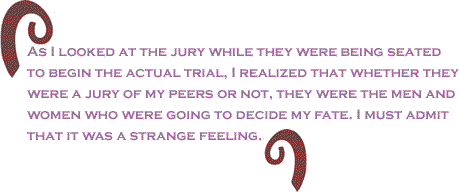
Yes,
I had agreed to support canceling the hearing after City
Council President Feeney, the State Senate President Murray,
Senate Licensing Committee Chair Montigney, Boston Liquor
Licensing Commission Chair Potaski, and the Senator had
worked out a deal to get an all purpose license for Wilburn
and four additional licenses for the district. However,
my agreement to have the hearing canceled came two weeks
after Wilburn came to my office and gave me a contribution
saying he appreciated my help and he wanted to give me something
that I could use to "Take your wife out to dinner."�
In addition how would any reasonable person not doubt my
guilt after hearing Barry expose the holes in their arguments.
However,
when Judge Woodlock continued with his discussion of what
the government had to prove, I began to realize what Barry
had meant when he said that Hobbs Act Extortion is a very
tricky piece of legislation. Let me let you hear for yourself.
Judge
Woodlock:��
Let
me explain a little bit about the case, what it is that
the Government has set out to prove.
They
have got four charges that are set forth in counts of what
is called an "indictment," and because the defendant
comes here presumed innocent, you will understand the indictment
does not mean anything except to lay out the charges that
the Government makes against Mr. Turner.
I
will read the language of the indictment. You will understand
that it is formal, like all aspects of this case, but in
Count One it is charged that on or about August 3,2007 in
the state of Massachusetts, Charles "Chuck" Turner,
the defendant herein, did knowingly attempt to commit extortion
under the color of official right and did thereby affect
commerce and the movement of articles in interstate commerce,
in that Charles "Chuck Turner" obtained a cash
payment in the amount of $1000 from a witness, knowing that
the payment was tendered in exchange for one or more official
acts as a Boston City Councilor in connection with the obtaining
of a liquor license for a proposed restaurant/lounge in
the City of Boston, which payment was not legally due Charles
"Chuck" Turner or to his office as a member of
the Boston City Council and the consent of the witness having
been induced or obtained under color of official right.
I
had heard the indictment before, but sitting in front of
the judge with the prosecutor and the jury to my right,
it seemed that I was understanding it for the first time.
All they had to prove was that I had received some money
from Wilburn and that I knew that he was giving it to me
for my helping to get a liquor license.� Since McNeil had
dropped the easily refutable conspiracy charge, it looked
like they had me in a box. It felt like a coffin.�
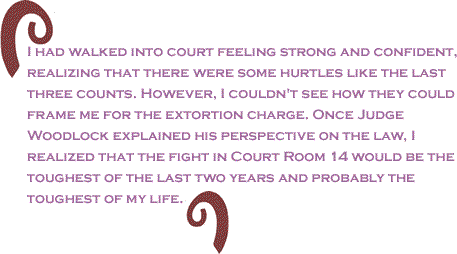
The
thoughts were coming a mile a minute as I tried to understand
what the indictment was saying regarding my guilt or innocence.
While I had no memory of Wilburn or the exchange of money,
there were pictures that he had taken showing me receiving
something that looked like money although our hands covered
whatever it was. Even though I didn't remember him, the
reality was that I filed a hearing order on the general
issue of liquor licenses that didn't mention him but mentioned
his proposed club, the Deja Vu. I couldn't believe that
it could be that easy to convict me. They had to need more
than a contribution from Wilburn and the filing of a hearing
order to convict me. What about the extortion? I didn't
even ask for money. Let me listen to the Judge, it can't
be this easy for them to frame me.
Judge
Woodlock:
The
government has to prove essentially four things:
First,
that on or about August 3, 2007 Mr. Turner knowingly obtained
cash or attempted to obtain cash from a person; second that
Mr. Turner obtained that cash or attempted to do so under
color of official right, meaning his office; third, that
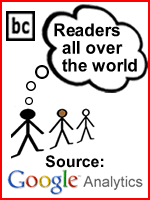 there
was a realistic probability, however, slight, that interstate
commerce or the movement of an article or commodity in interstate
commerce from one state to another could have been affected
in some way if the facts had been as Mr. Turner understood
them to be; and, fourth, and this may be important for you
to understand in its nuanced form, when we talk about extortion
in this context, it is not what the everyday view of extortion
is, but the Government has to prove that Mr. Turner engaged
in a purposeful act under circumstances as he believed them
to be that amounted to a substantial step toward the commission
of a crime of Extortion Under Color of Official Right and
that his criminal intent was strongly corroborated. Extortion
Under Color of Official Right means that a public official
obtained or attempted to obtain a payment to which he was
not entitled, knowing that the payment was offered to him
in return for taking or withholding or influencing official
acts. there
was a realistic probability, however, slight, that interstate
commerce or the movement of an article or commodity in interstate
commerce from one state to another could have been affected
in some way if the facts had been as Mr. Turner understood
them to be; and, fourth, and this may be important for you
to understand in its nuanced form, when we talk about extortion
in this context, it is not what the everyday view of extortion
is, but the Government has to prove that Mr. Turner engaged
in a purposeful act under circumstances as he believed them
to be that amounted to a substantial step toward the commission
of a crime of Extortion Under Color of Official Right and
that his criminal intent was strongly corroborated. Extortion
Under Color of Official Right means that a public official
obtained or attempted to obtain a payment to which he was
not entitled, knowing that the payment was offered to him
in return for taking or withholding or influencing official
acts.
The
first three seemed like slam dunks for Asst. US Attorney
McNeil to prove. They even have someone from Anheuser Bush
ready to testify about their beer having to cross state
lines to be served in the Deja Vu, if Wilburn had been able
to open the club and get a liquor license. Without this
piece of evidence I couldn't have been prosecuted by the
feds. The fourth element of proof sounded like one that
would give Barry some room to perform his legal magic. I
will admit that I didn't understand Judge Woodlock's language
as he explained the nuances of the fourth point they will
have to prove. However, my thought was that Barry will have
a field day as McNeil and Dowden, his assistant, try to
prove that my "criminal intent was strongly corroborated."
But what about the extortion, I didn't extort money from
Wilburn. Then Judge Woodlock answered my question.
Judge
Woodlock:
One
way of understanding what the Government has to prove is
also to outline what the Government does not have to prove.
The Government does not have to prove that Mr. Turner made
any specific threat or used force or fear to cause the person
to tender the money that the indictment says he obtained.
The Government does not have to prove that the defendant
made any request or demand for money or engaged in any other
affirmative inducement to obtain the money. Passive acceptance
of a benefit by a public official is sufficient, if the
public official knows that it is being offered - he is being
offered the payment in exchange for the exercise of official
power.
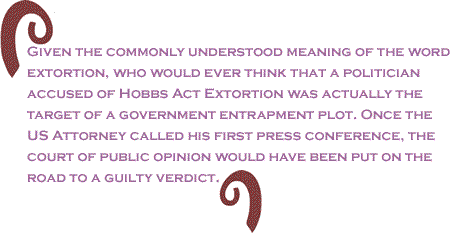
The
Government is not required to prove that the defendant made
a specific promise to perform a particular act, particular
official act, at the time of the payment or that the official
action or inaction actually occurred.
As
Judge Woodlock explained what the government didn't have
to prove, I could hear the cell door slamming behind me.
Finally, I understood what was happening. Hobbs Act Extortion
must have been written either by J. Edgar Hoover or at his
request. It was another of the weapons that Hoover had developed
for his campaigns of psychological warfare. "The passive
acceptance of a benefit" was called extortion so the
public would think that the official used coercion or force
to obtain money.
Given
the commonly understood meaning of the word extortion, who
would ever think that a politician accused of Hobbs Act
Extortion was actually the target of a government entrapment
plot. Once the US Attorney called his first press conference,
the court of public opinion would have been put on the road
to a guilty verdict.��
The
official did not even have to promise any action when receiving
the money. In fact the official didn't have to take any
action. As long as the jury is bamboozled into thinking
that the official was thinking about either doing something
official or thinking about not doing something official,
the frame up is in place. McNeil had the pictures that their
paid pawn had taken. I had filed a hearing order regarding
liquor licenses. The trap was set for a Hobbs Act Extortion
Conviction. What about the three other counts?
Judge
Woodlock:
Now
there are three more counts, and the three more counts are
essentially making false statements, and I will identify
them one by one. But what you should understand here is
that the Government has to prove that Mr. Turner knowingly
made a material false statement, material meaning something
that is going to influence decision-making or could on or
about a particular date; that Mr. Turner made that statement
voluntarily and intentionally; and, third that in this context
the statements were made to agents - made concerning a matter
within the jurisdiction of the Federal Bureau of Investigation.
So
the three counts. The first count says that Mr. Turner on
or about October 18th interviewed by the FBI at his office
in Boston City Hall as part of an investigation into payments,
and that on that occasion Mr. Turner made what the Government
says is a false, fraudulent or fictitious material statement
saying that he never received any money from the witness.
........made
a false, fraudulent or fictitious material statement by
stating that the witness never offered to hold a fund raiser
for him.
........made
a false, fraudulent, fictitious statement by stating that
the person, witness, had never offered him any money or
other assistance.
It
looks like another slam dunk for McNeil. As I said in Chapter
3, when the feds come calling, call your lawyer. When the
FBI agents came calling on October 18, 2008, the morning
of the Senator's arrest, I made a tragic error and talked
to them without a lawyer. I told them the truth as I remembered
it. Unfortunately, they had the tapes and pictures to show
that my memory was not very accurate. The jury would have
to find me guilty given the evidence unless they could be
convinced that I didn't remember.
I
had walked into court feeling strong and confident, realizing
that there were some hurtles like the last three counts.
However, I couldn't see how they could frame me for the
extortion charge. Once Judge Woodlock explained his perspective
on the law, I realized that the fight in Court Room 14 would
be the toughest of the last two years and probably the toughest
of my life. Fortunately, I had a legal team of street fighters
so I was confident that they would find and use every opportunity
to beat the frame up. McNeil and company despite Hobbs Act
Extortion were in for the fight of their life.
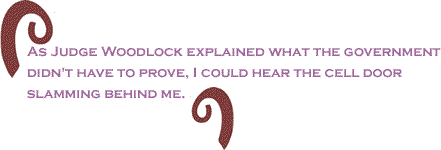
For
the next three days my legal team and Asst US Attorney McNeil
and his assistant, with the guidance of Judge Woodlock sorted
through over 100 jurors to narrow the panel down to 16:
12 jurors and 4 alternates. By the time the sixteen were
selected, there were three people of color: an Asian-American
woman, a Haitian-American woman, and an African-American
man. There had been a young African-American man who I thought
would have been open to my team's arguments but he was quickly
excluded from the pool. As I looked at the jury while they
were being seated to begin the actual trial, I realized
that whether they were a jury of my peers or not, they were
the men and women who were going to decide my fate. I must
admit that it was a strange feeling.
Much
to my surprise, McNeil and company stumbled coming out of
the starting gate. While it was impossible to gauge the
jury's reaction, it became clear that the media and public
were shocked to learn that Wilburn, the person Sullivan
and McNeil had projected as an innocent community business
man trying to get a liquor license, was the prosecution's
pawn being paid by Sullivan to execute an entrapment scheme.
It was difficult to know what the jury thought since based
on Woodlock's questioning they had not heard the original
hype around my arrest and my alleged conspiracy with the
Senator. However, the media and public were shocked and
dismayed that they had been misled.
When
Wilburn, their only witness on the extortion charge, took
the stand, the difficulties for the prosecution continued.
Wilburn was combative and hostile toward the prosecution.
He interjected that he felt that the US Attorney's office
has exposed him to the media a few weeks after my arrest
and had previously taken him off the payroll, leaving him
without income.
Initially
he weakened the financial aspect of the charge by saying
that he couldn't say how much money he had given me since
his FBI handler had not counted the money out in front of
him as he had in all previous situations where Wilburn was
given money to give to the Senator. However, the next day
on the stand, with coaching I assume, he said it felt like
a big enough wad of bills to be a $1000.
Barry's
cross-examination was masterful. By the time Wilburn left
the stand, he no longer seemed credible as a witness trying
to see that justice was carried out. Barry focused on Wilburn's
joblessness and was able to characterize him as someone
who was involved because of his need and desire for an income.
When Wilburn talked to the press after his testimony, he
revealed that he recognized the weakness of his testimony
when he said that even if I was not convicted of extortion,
I would be convicted of the three counts of lying to FBI
agents.
The
FBI agents' testimony regarding my "lies" was
uneventful. They recounted going to my office; my agreeing
to talk with them; their asking the three questions and
my answers. They said I became angry as I talked about the
historical role of the FBI and Hoover and their attempt
to subvert movements for justice. Obviously, the agents
were trying to make it seem as if I had been trying to take
their focus off my "criminal" actions rather than
acknowledging my righteous indignation at the role of the
FBI throughout history.�
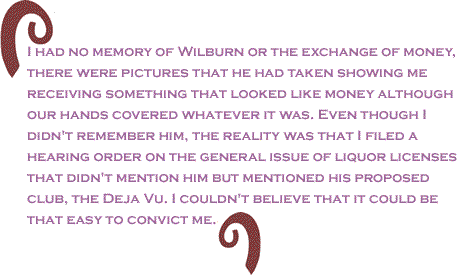
The
remainder of the prosecution's presentation flowed quickly.
They presented the Assistant Clerk of the City Council to
discuss the dropping of the hearing order regarding liquor
licenses. Barry used his presence to verify that Terri and
I by the time of our arrest had lent $120,000 to the campaign
in order to pay the expenses of running a district office
and monthly luncheon discussions we called Roundtables.
He also pointed out that by the beginning of the trial the
debt owed to us had grown to $170,000.
By
the end of their presentation, the prosecution had laid
out the four elements of their case: First, that I had received
money from Wilburn. Second, that I had engaged in the official
acts of filing a hearing order and agreed after initially
disagreeing to support the dropping of the hearing order.
Third, that I had lied to the FBI regarding three questions
asked about my involvement with Wilburn. Fourth, that if
Wilburn had been able to open a club with a liquor license
and Budweiser had been sold in the club that beer would
have had to come across state lines given the fact that
there was no Anheuser Bush distillery in Massachusetts.
The
reality, however, was that their case was so weak in the
minds of the media and the public that the more conservative
of the Boston dailies, the Boston Herald, sent a photographer
and a reporter to my house after the last day of the prosecutions'
presentation to interview me. At first, I refused to speak
to them given my previous experiences, but the reporter
seemed to be sincere when he said that the story was going
to focus on how unusual it was to have the prosecution in
a federal case present such a weak case. The next day's
Herald almost predicted my victory with a picture of me
covering the front page of the tabloid.
Then
came the opportunity to present our defense. Our plan was
to put Steve Miller, the head of the law firm which represents
over 70% of the successful liquor license applicants in
Boston to explain how he obtained a beer and wine license
for Wilburn without Wilburn even going to the hearing. Also,
we wanted to ask him to explain what happened to the $1000
he asked Wilburn to provide after he had initially told
Wilburn that he would help him obtain a license from Potaski
free of charge. However, he was able to dodge the subpoena
server.
An
additional key element in our defense was to be the questioning
of Chairman Potaski of the Licensing Commission to find
out how Wilburn had obtained a beer and wine license without
even going to the hearing. We also wanted him to explain
how he was able to grant this license when Wilburn didn't
even have a location for the club. While we were able to
serve him the subpoena, he didn't show up on the day he
was to testify.�
The
third element was to be witnesses who could explain the
type of work I had been doing over the years to paint a
picture of myself and my work to counter the picture McNeil
had attempted to paint.�� The fourth element of our defense,
my taking the stand to testify, had been debated for months.
Barry, my lead attorney, thought it would be madness for
me to take the stand. In general, he viewed defendants taking
the stand as a dangerous strategy. That gave the prosecutor
an opportunity to ask what ever questions he chose, creating
dangers that could not be planned for in advance.
In
my case, he felt that not only was it dangerous, it was
absurd given the fact that what I had to say would have
so little credibility. I agreed that to say to the jury
that I had no memory of even meeting with Wilburn on any
of the alleged occasions that he had documented would be
hard for them to believe. However, if I didn't testify and
was found not guilty of the governments' four charges, I
would still be guilty of the moral crime of hypocrisy.
Throughout
my life, I've said to people that we have to be willing
to speak truth to power despite the dangers. I have pointed
to our ancestors' fight for freedom and the dangers they
had to face. I've questioned how we could betray their faith
in us that had inspired them to suffer unimaginable degradation?
Given what they had faced in order to build a platform for
us to build on, isn't it our responsibility to stand up
for the principles we believe in? Isn't that what they would
expect of us? What legacy would we leave to future generations
if we don't lead principled lives of courage.
When
I had run for the City Council at age 59, I said that I
was running to test the use of the office as an organizing
tool and to try to set a standard for principle based politics
rather than the politics of expediency which from my perspective
was destroying the possibility of building a just society.
How after a lifetime of asking others to have faith that
the principled life is its own reward, could I refuse to
take the stand because of legal expediency. How could I
face my constituents if I did that. How could I look at
myself in the mirror and not see the word HYPOCRITE written
across my face.
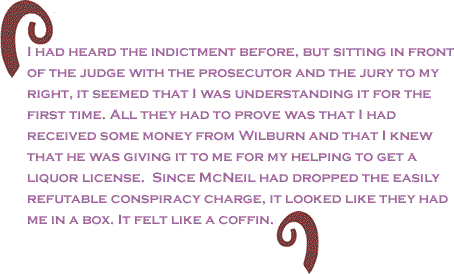
I
argued with my lawyers that elected officials had a responsibility
to take the stand whenever accused of betraying their public
trust. When they replied that they didn't agree and that
the law gave the defendant the right to choose what was
the best course to win the case, I said that there has to
be a higher standard for elected officials. How could we
restore the people's faith in the integrity of elected officials
if elected officials hide behind legal smoke screens to
avoid questions that we should face and answer, regardless
of the consequences?
Ultimately,
they agreed. I was the client and they had a responsibility
to abide by my choices. So, they agreed to have me take
the stand. However, It was hard to look in their eyes because
I could see the words that they were too respectful to say.
"How could you do this not only to yourself but also
to us, your lawyers. We have worked long and hard under
your terms to prevent Sullivan from getting away with his
plot to frame you and now you are preparing to throw it
away by not following our advice".
In
attempting to live a principled life, I have often had to
face situations where I had to choose to stand alone. This
one was the toughest. No one supported my taking the stand.
Terri had steadfastly supported me in this ordeal even when
she had reservations. When I told her that I had to testify,
she said that I was making a horrible mistake that she felt
would lead to my conviction. She then said she knew that
if I had made up my mind, she wasn't gong to be able to
change it. So her position was that she would say no more
and she didn't. However, every once in a while I could see
that "Why is he doing this?" look come onto her
face.
Even
the reporters covering the trial, some of whom had become
more sympathetic, looked amazed� when I said yes to their
question of whether I was going to testify. After I explained
why, I could almost hear them saying to themselves, "I
used to think he was crazy, now I have no doubt". Sarah
Ann Shaw, Boston's first black TV news reporter, an activist,
and a friend of almost 60 years, standing on the edge of
the reporter's ring said, "Chuck you can't do that".
My response was "I have no choice". Isaura Mendes,
a community peace activist and friend, who had lost two
sons to street violence, pleaded as we walked to the courtroom
that I not testify. All I could do was look at her and say,
"Have faith, it will all work out."
As
I walked to the stand, I thought if I am found not guilty,
people will say I got a lucky break. If I am found guilty
I will be viewed by my community as well as others as foolish
at best and crazy at worst. As I walked up the small set
of stairs to sit in the witness chair, I said, "You
and me God. You appreciate why I have to testify."
As John prepared to lead me through my direct examination.
I looked at the jury and wondered what they would think
when they heard my story. Then John drew my attention back
to him and led me smoothly through my background, work as
a Councilor, my response to the Senator's email, and the
subsequent events.
Then
McNeil approached me with his Cheshire like grin. I remember
him putting on the viewing screen the picture Wilburn took
of his hand covering mine with something between sticking
out. I remember McNeil continuously asking what was it that
Wilburn had put in my hand and my continuously saying that
I couldn't say because I didn't remember but that the picture
indicated that he was giving me something that looked like
it could be money. Later he said, "If you don't remember
the meeting, how can you say that it was not a thousand
dollars"." I calmly replied, "Nobody has
ever handed me a thousand dollars. If he had given me a
thousand dollars, I'm sure I would remember".
The
most vivid exchange was his pounding away at the fact that
when Wilburn put his hand over mine, I didn't look down
to see what he was giving me, as if to say that I didn't
look down because I knew that there was $1000 there. Again,
all I could say was the truth which was, "I didn't
look down because it's rude and impolite to look at the
amount of a contribution that someone is giving you".
Then I used a term that a group of ministers had used when
I described the situation to them. They recounted that parishioners
often give them church contributions in a similar fashion.
They call it a preacher's handshake. The next day the newspapers
led with stories not only about my testimony that I didn't
remember but also about my preacher's handshake.
Frankly,
I don't remember the other questions that he asked. When
I left the stand, I looked at the jury but I couldn't figure
out their reaction. I was sure, however, that for better
or worse, it was my testimony that was going to seal my
fate. My legal team felt the same way and decided to end
our defense with my testimony. They felt that to put on
other witnesses would be anticlimactic. Barry and McNeil
then made their closing arguments, Judge Woodlock gave his
instructions, and the jury retired to decide my fate.��
Time
dragged as I waited for the jury to make up its mind. A
couple of days later, the clerk summoned those of us who
were waiting for the verdict back to the courtroom to hear
the jury's decision. As I waited for the forewoman of the
jury to read the verdict, I felt unusually peaceful. Guilty
or innocent, we had done our best. As I listened to the
word guilty given after each of the four counts, I still
felt peaceful and said to myself, "At least its over."
As
I left the courtroom, surrounded by those who had been with
me every day of the trial, I felt that I had to say something
that would help them put this emotionally trying moment
in the context of our mission. So when we arrived on the
first floor, I asked people to gather around me before I
went out to talk to the press. I began by thanking them
for the support and energy they had given me throughout
the ordeal and particularly these last two weeks when they
and others had filled not only the courthouse's largest
courtroom but also an additional courtroom. I let them know
that Terri and I owed them a debt of gratitude that we could
never repay but would always carry in our hearts.
I
reminded them that many have fallen in the past� in the
struggle for justice and that more will fall in the future.
However, through it all, we must never forget that there
is no sacrifice too great in our fight to create a just
world for future generations. As we watch the old world
die, it will try to destroy all around it. We must be like
the phoenix rising out of the ashes of the past, focusing
on the future that we are here to create; not letting the
storm and strife deter us from fulfilling the mission for
which we were born.
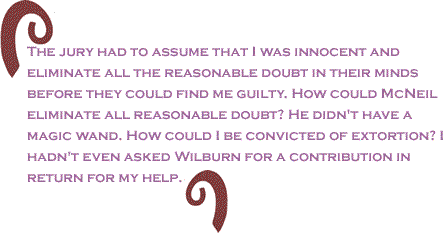
Outside,
facing the cameras and the reporters, I vented my anger
at the injustice of what had just occurred. At the same
time I reminded them that while Sullivan had succeeded in
temporarily taking out one soldier, the war for justice
would continue. I then went home to talk with Terri about
how we would move our lives forward now that I was a convicted
felon. A half an hour later, I walked into the house, hugged
Terri, and said that I had been found guilty on all four
counts. She said, "I know but at least it over".��
Analysis:
1)
Why is the Chapter entitled Three Ring Circus:
Naming
this Chapter was the most difficult of the eight.� I've
tried to choose titles that would give the reader a feeling
for what was to be discussed in each Chapter. There were
so many different activities that went on during the trial,
I couldn't think of the phrase that would capture for the
reader the essence of the experience. Then in a moment of
relaxation, memories of my childhood love of circuses popped
onto my mental viewing screen. I could see the trainers
working with the different sets of trained animals - lions,
tigers, horses, elephants, etc. Then came the pictures of
the clowns getting into and out of tiny cars and doing anything
to get a laugh while providing a transition from the animal
acts to the high wire acts and the death defying aerial
artists on the trapezes.
Suddenly,
my question was answered.� The trial was like a three ring
circus. In the first ring was McNeil leading Wilburn, the
FBI agents, and the other government witnesses through their
paces, getting them to jump through his hoops. Wilburn was
similar to an unruly lion, snapping and growling, not content
to jump through the hoop at the snap of McNeil's whip like
tongue, but then remembering that if he didn't he would
not get fed.
The
manager from the beer company represented the transition
role of the clowns. He wasn't particularly funny, but he
was essential to the drama. If he wasn't there, we wouldn't
need a defense. Without him, there was no basis for a federal
trial. He was the lynch pin that allowed Sullivan and McNeil
to take a state issue and make it into a� federal crime
by identifying the interstate connection, slight though
it was.
In
the third ring, my choosing to take the stand was like an
aging trapeze artist deciding to do a triple somersault
without a net to demonstrate the time honored principles
of the craft rather than settle for the crowd pleasing stunts
that mocked the art of flying.
2)
A just law for a serious crime.
To
me the betrayal of the public trust by an elected official
is an heinous act, flagrantly criminal as Webster defines
it. Its an act that erodes the essence of democracy, the
trust of the people in the integrity of those whom they
elect to represent them. Given that reality, a healthy society
has to have processes and laws that enable it to identify
those who would betray their trust and to prosecute them
for their crimes.
At
the same time, those processes and laws must be carefully
crafted so that they can not be misused to target honest
officials. Hobbs Act Extortion does not meet that litmus
test. As defined by Judge Woodlock in my trial, Hobbs Act
Extortion makes it difficult to distinguish an elected official
who is betraying his trust from the elected official who
is carrying out his responsibilities and soliciting contributions
to cover the expenses of running for and maintaining office.
Recently,
I read an article in the Boston Globe which said that the
director of the consortium of Massachusetts medical technology
firms was going to Washington to meet with Senator Kerry.
The evening before the meeting, he was scheduled to attend
a Kerry fundraiser at which he would undoubtedly make a
contribution, perhaps even hand it to the Senator, saying
that he appreciated the Senator's work.
The
purpose of the next day's meeting was to lobby the Senator
to oppose a provision in the new health care law that the
medical technology firms felt would limit the profits needed
for their research. At the moment, the Senator is on record
as opposing any changes. If Senator Kerry based on the conversation
decides to change his position, can he be tried under Hobbs
Act Extortion. A contribution of money was offered by a
person who hoped that the Senator would engage in a certain
official act. If the Senator then engages in that act, it
seems he could be subject to investigation and possible
prosecution.
The
name of the act itself is a problem in that it undercuts
the whole concept of innocent until proven guilty. Once
the public hears that the crime is extortion, there is a
mind set put into action that create a psychological toxicity
around the official even if proven not guilty a year or
two later. Remember, I didn't go to trial until 23 months
after my arrest.
We
are only six years away from the resignation of Attorney
General Gonzales based on the fact that he and President
Bush's chief political operative, Karl Rove, conspired to
fire eight US Attorneys who were not willing to use their
prosecutorial power against those that the Bush administration
viewed as enemies.
There
is a long history of US prosecutors using their powers to
attempt to remove black elected officials and officials
of color from office. Havey Silverglade, a prominent Boston
defense lawyer, recently wrote a book, Three Felonies a
Day, that describes a number of cases which he believes
are part of a national pattern of misconduct by US Attorneys.
Given the historical and present reality of prosecutorial
misconduct, Hobbs Act Extortion is a dangerous law, I believe,
in its present form.�
3)
What is a federal crime?
My
case is a good example that a federal crime is any crime
where the prosecutor can establish that the crime had some
connection to a state other than the state in which the
crime took place. In my case, alcohol would have crossed
state lines to be served in Wilburn's club so that fact
alone makes it a federal crime.
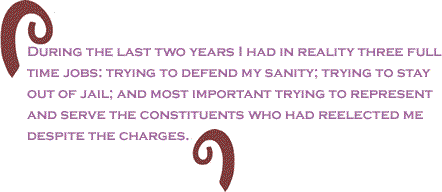
The
reality is that the US Attorney has an almost unlimited
ability to take any case to a federal level or launch an
entrapment scheme in almost any situation by just establishing
some type of connection to another state. In Chapter 3,
the Big Lie, I included comments from defense lawyers and
federal judges, including Chief Justice Wolf criticizing
former US Attorney Sullivan for taking drug cases from state
court and trying them in federal court.
The
Chief Justice Wolf cited Sullivan's practice as a misuse
of federal resources that should be used on priorities such
as white collar crimes and public corruption. Massachusetts
federal judge Nancy Gertner, discussing Sullivan's practice,
cited her view of the inappropriateness of trying drug cases
in federal court given the "bludgeon" like sentences
meted out at the federal level.
The
powerlessness of the federal judges, even the Chief Justice,
over the way the US Attorneys use their prosecutorial resources
was demonstrated when it was reported that Chief Justice
Wolf at the 2010 swearing in of the new Massachusetts US
Attorney, Carmen Ortiz, said that he hoped she would not
engage in Sullivan's practice of taking drug cases out of
state court and trying them in federal court.
4)
Taking the stand in your own defense.
My
status as a relative novice in the legal world is demonstrated
by the fact that until my trial I didn't realize that defense
lawyers try to avoid having their clients take the stand
to testify. The primary concern seems to be that it allows
the prosecutor to have the opportunity to open up whatever
line of questions they may choose. Since the defense has
carefully thought through what issues to discuss and which
to avoid, having the accused testify creates too much opportunity
for unscripted testimony.
Even
judges have concerns about defendants testifying. When Judge
Woodlock learned that I planned to testify, he asked for
a sidebar conversation with me, my lawyers, and the prosecutors.
In the sidebar, he explained that I was not required to
testify. In fact, he said he had seen defendants choose
to testify and then regret the decision that they had made.
However, he didn't tell me that if he as well as the jury
did not believe my testimony, he would find me guilty of
perjury and add more time to my sentence.
However,
even if he had told me, I still would have testified. As
I said in the narrative, from an ethical/moral standpoint
I didn't have a choice. As a candidate for elective office,
I had told the voters that my goals as an elected official
would be to demonstrate the value of organizing as a tool
for effective representation and to establish a pattern
of principle based politics. How could I now say to my constituents
that I hadn't testified because it was legally expedient.
In other words, there was less risk of being convicted by
not testifying than there would be if I testified. Even
if they accepted the rationalization, I couldn't.
 During
my years of fighting for justice and against oppression,
I developed the belief that those of us who fight for justice
must embody the principles and values of the society we
are trying to create. That is, we need to become living
examples of the type of society we wish to build. To attempt
to live by your principles in an unprincipled world can
seem foolish at best, perhaps crazy at worst. However, I
have found that following the dictates of my heart has given
me clarity of thought, peace of mind, and a strength of
will that compensates for whatever "sacrifices"
needed to be made. During
my years of fighting for justice and against oppression,
I developed the belief that those of us who fight for justice
must embody the principles and values of the society we
are trying to create. That is, we need to become living
examples of the type of society we wish to build. To attempt
to live by your principles in an unprincipled world can
seem foolish at best, perhaps crazy at worst. However, I
have found that following the dictates of my heart has given
me clarity of thought, peace of mind, and a strength of
will that compensates for whatever "sacrifices"
needed to be made.
It
was difficult taking a path in the trial that those around
me did not understand. However, it was a path I knew in
my heart I had to follow. I didn't know whether it would
lead to a not guilty verdict or a guilty verdict. However,
I did know that whatever the outcome, I would be at peace
because I had followed the dictates of my heart; because
I had stayed true to my principles, whatever the material
cost. While I certainly would like to be back in Boston
with Terri, my children, friends, and community, I am at
peace as I prepare to return to the struggle.
C)
Action Steps:
1)
Hobbs Act Extortion:
I
believe that we need to have research units in each state
to gather the history of the use of Hobbs Act Extortion.
This research then needs to be collected and assess to determine
the the extent to which the Act has been used nationally
as a political tool by prosecutors. If my suspicions are
correct, a campaign to repeal the Hobbs Act Extortion and
formulate, if necessary, a new federal law for public officials
who violate their trust.
2)
What is a federal crime?
Again,
we need research units in each state to assess the extent
to which prosecutions focus on the areas of white collar
crimes and public corruption. In those areas, we need to
assess the extent to which the cases seem to have a political
motivation and the extent to which the federal connection
seems substantive as opposed to expedient. In the other
categories of crimes identified, there need to be similar
assessments. The data then needs to be correlated on a national
basis to determine if there is a need for a campaign regarding
the misapplication of federal prosecutorial power.
Next
Chapter: Ladies and Gentlemen of the Jury
A
Luta Continua - The Struggle Continues,
Chuck
Click here to
read any part in this BC series.

BlackCommentator.com Editorial Board Member Chuck
Turner - Served as a member of the Boston City Council
for ten years and eleven months. He was a member and founder
of the Fund the Dream campaign and was the Chair of the
Council�s Human Rights Committee, and Vice Chair of the
Hunger and Homelessness Committee. Click here to
contact Mr. Turner. Your email messages will be passed on
to Mr. Turner by BC. You may also visit SupportChuckTurner.com.
You
may also write to Mr. Turner. The address is:
Charles
Turner #80641038
Hazelwood Penitentiary, P.O. Box 2000
Bruceton Mills, West Virginia 26525
|

